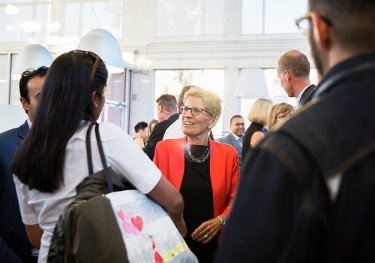Trump and the Future of Our U.S. Employment Immigration System
So much of Donald Trump’s negative immigration rhetoric targets the undocumented population and refugees. But what about employment immigration? Trump has criticized many components of our employment immigration system as well. However, regarding actual negative changes to our employment immigration system, I believe his bark is worse than his bite for several obvious reasons. First, it makes very bad economic sense. Many of the most successful companies, national laboratories, hospitals, and other organizations utilize talented foreign national employees to complement their work force.
Still, his direct criticism of the H-1b program and his frequent severe criticism of NAFTA (the North American Free Trade Agreement) raise concerns. Below is a review of Trump’s posture on three components of our employment immigration system and why I hope he will be wise enough to encourage, rather than deter, the best and brightest from around the globe to immigrate and further contribute to this country. These areas include the following:
- Trump’s criticism of the H-1b Program.
- Trump’s criticism of NAFTA and the potential impact on TN visas.
- A broad attack on our employment immigration system means steep consequences for our economy.
Trump’s Criticism of the H-1b Program
Trump has widely criticized the H-1b visa program, the most common and straightforward visa that U.S. companies use to hire talented foreign nationals. The visas are already capped at 85,000 annually, a number that has remained largely unchanged since the H-1b cap was established in 1990*.
To qualify for an H-1b visa, a foreign national must be offered a position at a U.S. company that requires at least a bachelor’s degree level of education. For the past several years, demand for H-1bs has greatly outstripped supply by more than a factor of three. This high demand has been driven by our rapidly growing technology sector, since the U.S. supply of engineers and other STEM degree holders has not kept up with the growth of the sector. This shortage has resulted in companies being unable to hire extremely talented foreign nationals who are critical to the continued growth and success of many companies and our economy as a whole.
President Trump said he will greatly change the existing H-1b program, making it even more difficult to hire foreign nationals.
Despite compelling economic data to increase the number of H-1b visas, President Trump said he will greatly change the existing H-1b program, making it even more difficult to hire foreign nationals. At the same time, like he has on many issues, Trump has flip-flopped on this issue and stated that if companies need skilled, foreign workers, he will make sure they are allowed to hire them.
The fact that there is strong bipartisan support for the expansion of the H-1b program, particularly from our technology sector, suggests that Trump might back off on his attack of the H-1b program. The fact that his base is far more focused on undocumented immigrants also suggests that it will be easier, politically, to sweep his anti-H-1b comments under the rug. I do think it is unlikely that he will expand the H-1b program, since such a move will draw for more press and criticism than simply leaving the program intact.
*Congress actually did increase the number of H-1b visas temporarily around the first tech bubble, from 1999 to 2003. The Cap was increased to 115,000 for 1999 and 2000 and increased to 195,000 from 2001-2003. The CAP then reverted back to 65,000, the original 1990 level, with an additional 20,000 allocated to individuals with U.S. Master’s degrees.
Trump’s Criticism of NAFTA and the Potential Negative Effect on TN Visas
 Trump’s strong NAFTA criticism is quite concerning given the fact that TN visas, one of the most straightforward work visas for Canadian and Mexican professionals, is a direct product of NAFTA (TN stands for “Trade NAFTA”). “Tear up NAFTA,” and you effectively tear up TN visas. Even if Trump dramatically changes NAFTA, it seems inconceivable that NAFTA would not immediately be replaced by bilateral treaties with Canada and Mexico that allow for visas for professionals, based on the importance to the U.S. of Mexico and Canada as our principal trading partners.
Trump’s strong NAFTA criticism is quite concerning given the fact that TN visas, one of the most straightforward work visas for Canadian and Mexican professionals, is a direct product of NAFTA (TN stands for “Trade NAFTA”). “Tear up NAFTA,” and you effectively tear up TN visas. Even if Trump dramatically changes NAFTA, it seems inconceivable that NAFTA would not immediately be replaced by bilateral treaties with Canada and Mexico that allow for visas for professionals, based on the importance to the U.S. of Mexico and Canada as our principal trading partners.
A Broad Attack on Our Employment Immigration System Will Have Lasting Repercussions on Our Economy
If Trump does broaden his attack on immigration to our employment immigration system, the consequences will be felt for a very long time. While the U.S. is still perhaps the most desired location for many professionals and innovators, our lead over other countries has been dwindling even before Trump. Many countries like Canada and several European countries have been more aggressively recruiting top global talent for some time. They have created immigration systems that are easier to navigate, and without the long wait times that exist in the U.S. immigration system. Moreover, location continues to become less important for many companies as technology enables employees to work remotely with greater ease. With these already looming changes and issues, the U.S. already faces substantial challenges in retaining the world’s best and brightest. If Trump exacerbates this problem by making our existing employment immigration system even more challenging, the stature of the U.S. as the preeminent country for innovation and talent may become increasingly a thing of the past.
Protest Photo Credit: Minister Erik McGregor Flickr via Compfight cc
Business Photo Credit: Premier of Ontario Photography Flickr via Compfight cc
